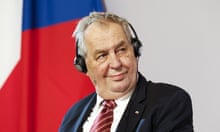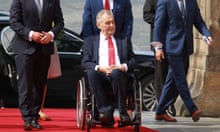The billionaire businessman-cum-politician at the White House on Thursday has become the most powerful man in his country by riding a wave of nationalist sentiment. Under investigation for alleged misdeeds involving his business empire, he has responded by painting himself as the victim of a political witch-hunt. He has attacked the leading investigator in his case in personal terms while, according to critics, stealthily seeking to hamper the inquiry. The role of his children has also come under scrutiny.
That description applies not just to Donald Trump, but also to Andrej Babiš, the Czech prime minister, who this week becomes the first Czech Republic leader in years to be hosted by a US president.
Babiš is a successful tycoon and the second-richest man in the Czech Republic, but his fitness for office has been questioned amid accusations that he fraudulently obtained EU funds for his business empire and has multiple conflicts of interests.
Besides a shared experience of political scandal and an appetite for financial profit, the two are also prone to anti-immigrant rabble-rousing – a subject both have exploited to build a political base.
Officially, the meeting between the pair is expected to be a brief affair focusing on shared strategic interests such as the Czech contribution to Nato and trade with China, with Trump believed to be pleased with Babiš’s recent decision to ban Chinese-made Huawei mobile phones from government offices amid concerns that they could be used for data theft (something the company denies).
“[Babiš] is almost certainly more intelligent than Trump and definitely better educated; he speaks English, German and French,” said Michal Musil, a senior editor and writer with the Prague-based Reporter magazine. “Trump reminds one of a mobster; Babiš is somehow different. He can manage legal things better.”
Babiš – owner of a giant multi-industry conglomerate called Agrofert (now held in a trust to fend off conflict of interest allegations) – is believed to be richer than Trump, worth an estimated $3.7bn (£2.81bn) to the US president’s $3.1bn.
He may also be politically more secure. Where Trump is dogged by low approval ratings and the spectre of impeachment, the Czech prime minister’s popularity has proved resistant to a succession of embarrassing accusations. After Czech journalists quoted his son, Andrej Jr, last November claiming to have been abducted in Crimea to stop him testifying in a police inquiry into his father’s dealings, Babiš faced mass protests urging him to resign. His poll ratings subsequently rose.
If an election were held tomorrow, Babiš’s Action for Dissatisfied Citizens (ANO) party would almost certainly win. Babiš, who became prime minister in 2017, said recently he would like to remain in office until 2025, a goal some say may only be threatened if the booming Czech economy faced sudden recession.
His enduring popularity seems all the more remarkable given that the Slovakia-born 64-year-old speaks imperfect Czech, often lapsing into his native Slovakian when angry. “He approached me in 2012 seeking cooperation when he was first entering politics,” said David Ondráčka, Czech director of Transparency International, which has scrutinised Babiš’s mingling of his political activities with his business interests. “I told him, ‘you have no chance. You have no programme and you don’t speak Czech.’ But he has made enormous strides with the language since then.”
Babiš has also compensated for his lack of a political agenda by fashioning ANO into a catch-all party that eschews a definable ideology to appeal to a cross-section of society. Senior citizens have been wooed with higher pensions and generous public transport concessions while free school meals have been used to win over parents with school-age children – policies that have enabled ANO to attract voters from the Social Democrats and the Communists.
Jiří Pehe, director of New York University in Prague and a Czech political analyst, brands the approach “oligarchic populism”, distinguishing it from the more ideologically-driven version pursued by leaders of other east European former communist states, namely Hungary’s prime minister Viktor Orbán, and Jarosław Kaczyński, leader of Poland’s ruling Law and Justice party, who have identified themselves with far-right nationalism and revelled in open conflict with Brussels. Babiš, in contrast, has plotted a more centrist course intended to keep the Czech Republic in harmony with the EU, despite disagreements over migration.
The reasons may be pragmatic, primarily driven by Babiš’s business interests rather than any principled commitment to democracy and the rule of law that are the EU’s core values. Agrofert – which includes food, agriculture and chemical companies – is heavily dependent on European subsidies, which have been jeopardised by a conflict of interest complaint tabled by Transparency International, aimed at forcing him to choose between his political and business careers and prompting an investigation by European commission auditors. The commission is expected to announce its ruling next month.
There have also been worrying signs of possible covert interference. In January, the inspectorate of the Czech security forces (Gibs) opened an investigation into Pavel Nevtípil, the detective leading the criminal probe into the award of an EU grant to a hotel and business centre owned by Babiš, an inquiry that resulted in the prime minister facing a charge of fraud that has still to reach court.
There is no evidence that Babiš personally ordered the investigation but he had previously openly criticised Nevtípil. Separately, last week, after Babiš lodged an appeal with the Bohemian regional council against a ruling by a lower municipality that he was in breach of conflict of interest laws, Czech Radio reported that the authority had undergone a sudden bureaucratic shake-up that could change how the case is dealt with. The council insisted that the reorganisation had been planned long before but no paperwork was produced to support the assertion.
Such ambiguity may be the template for Babiš’s future rule. “His approach is very soft,” said Musil. “He doesn’t want to implement sweeping changes. It’s more small step by small step that cannot be easily covered by the western media. He doesn’t go as far as Orbán because he knows the media aren’t that dangerous to him. I don’t believe he’s good for the country or the political culture – but it could be worse.”









